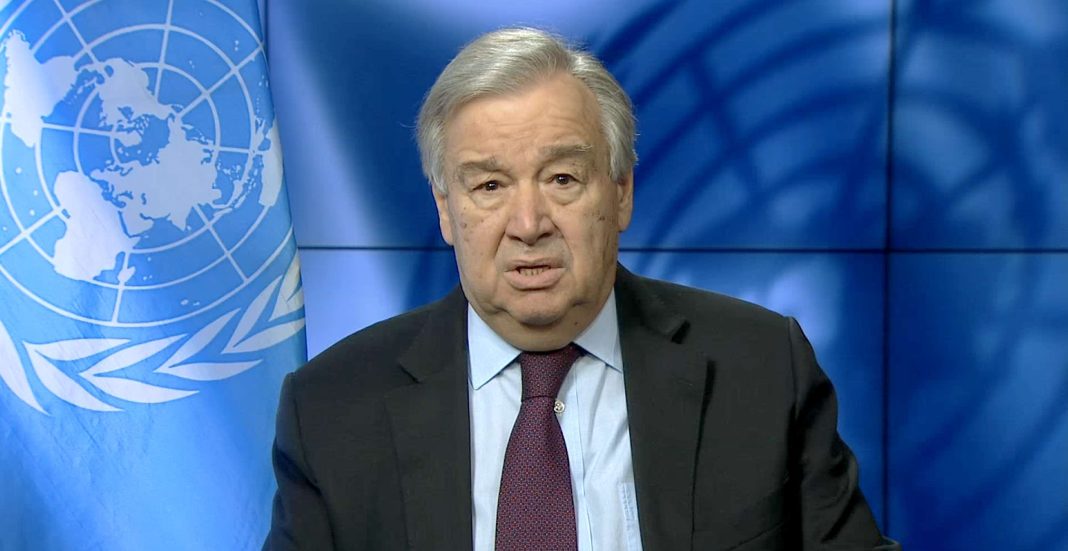By Janet Ekstract
NEW YORK- The annual Davos Forum where world leaders meet in Davos, Switzerland to report on their respective global issues, morphed this year into The Davos Agenda in a series of online debates, discussions and reports from leaders around the globe with the focus on geopolitics and its global effects. UN Secretary-General Antonio Guterres opened the virtual Davos Agenda 2022 on a sobering note when he commented: “The last two years have demonstrated a simple but brutal truth – if we leave anyone behind, we leave everyone behind”, the UN chief said.
Speaking from United Nations headquarters in New York City, Guterres added that this year’s virtual event is meeting “in the shadow of an enormously difficult period for economies, people and our planet.” Guterres reminded participants there is a critical need to focus on three main priorities: confronting the pandemic with equity and fairness by making vaccines widely available in the developing world, fixing the global financial system with restructuring and the third priority is climate action which will require nations to urgently step up their UN climate commitment goals.
With regard to vaccine equity globally, the secretary-general reiterated that “vaccination rates in high-income countries are “shamefully” seven times higher than in African countries.” Guterres also emphasized that the next pandemic needs to be prepared for with investments in monitoring early detection and rapid response plans created for every country with the World Health Organization’s (WHO) authority strengthened. The secretary-general lamented the unmet goal of WHO which was, he said: to “vaccinate 40 percent of people in all countries by the end of last year and 70 percent by the middle of this year.” Guterres said the original goal didn’t even come close.
As for the global financial system, Guterres pointed out: “At this critical moment, we are resetting in stone a lopsided recovery.” The UN chief said low-income countries are suffering from a major disadvantage on the global financial scale. As Guterres commented: “They’re experiencing their slowest growth in a generation – and trying to dig themselves out with woefully insufficient national budgets.” He highlighted record inflation, shrinking fiscal space, high interest rates and skyrocketing energy and food costs that he explained are striking every corner of the world but especially low and middle-income countries. Guterres added that such nations are “shackled by mounting debt and exorbitant interest rates” while he remarked that these same nations are ineligible for debt relief despite soaring poverty, unemployment and development losses.
The UN chief explained that the final priority includes an essential system he termed ‘fit for purpose’ that encompasses urgent debt restructuring, reforms in long-term debt architecture and an expansion of the Common Framework for Debt Treatment to middle-income countries. Guterres also requested global governments and institutions move beyond Gross Domestic Product to measure for investment risks while addressing corruption and illicit financial flows with an eye toward ensuring tax systems are “fair and designed in a way that truly reduces inequalities.”
Meanwhile, according to the UN’s flagship economic forecast, released last week, the world is just now emerging from the depths of a paralyzing economic crisis where recovery remains fragile and inequitable. The report states that continued labor market challenges exist as well as supply-chain disruptions, rising inflation and major debt traps which is all leading to an extremely slowed recovery. The third priority which is no less crucial, Guterres warned, is climate action, and said that even if all developed countries met their commitments for a dramatic reduction in emissions by 2030, global emissions will still be sky high and fall short of keeping the goal of 1.5 degree C within reach.
UN-backed research reports that on a global scale there has to be a 45 percent reduction in global emissions during this decade despite an outlook of a 14 percent increase by 2030. The UN chief insisted that coal must be phased out and that a top priority must be a targeted phase-out with no new coal plants built. Both the governments of Indonesia and Vietnam announced their intentions to eliminate coal and transition to renewable energy. As well, South Africa has in place a just energy transition partnership to move away from coal.
Guterres took part in a meeting of the Glasgow Financial Alliance for Net Zero last week – a group that mobilized over 130 trillion USD around the net-zero goal. The UN chief expressed that the alliance “has set the gold standard” and that “the entire financial system should follow their lead.” The secretary-general reiterated that the international community needs the support, ideas, financing and the voice of the global business community on this issue. As Guterres urgently pointed out: “We cannot continue building walls between the haves and have-nots.” The UN leader added that the world “cannot afford to replicate the inequalities and injustices that continue condemning tens of millions of people to lives of want, poverty and poor health.” He concluded that even 1.2 degrees C of warming has “already brought devastating consequences and soaring price tags measured in dollars and despair.”
The Davos Agenda has made it clear that climate change is a threat to global security where over the last 20 years, the economic toll from climate-related disasters soared by 82 percent. In 2021 alone, extreme weather caused 120 billion USD in insured losses, killing 10,000 people. Meanwhile, in 2020, climate shocks forced 30 million people to flee their homes, triple the number of those displaced by war and violence with one billion children the victims and, at extremely high risk of suffering the impacts of climate change. The secretary-general concluded: “Turning this ship around will take immense willpower and ingenuity from governments and businesses alike, in every major-emitting nation.”




